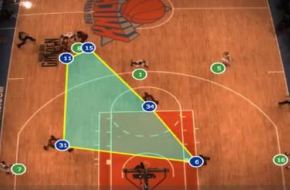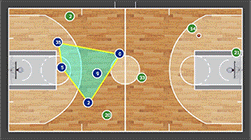
At Praescient Analytics, we are all about making data work for you. Whether through collection, modeling, or analysis, our analysts are constantly making data sing. In particular, our Analysis as a Service team (A3S) works every day on using data for predictive analysis; arming decision-makers with the proper information and context for them to confidently stride into the future of their business.
That’s why I found the announcement by the Sacramento Kings that they were implementing a crowd-sourcing element to their draft preparation so fascinating. Here is a struggling NBA franchise that is asking for help in evaluating prospects from College Basketball and abroad from the general public. You simply rank your prospects and explain your methodology in a submission to the Kings website. The two best entrants will be invited to the “Draft War Room” to sit with the Kings decision-makers on draft night.
Undoubtedly, a large portion of this initiative is for publicity and to excite a fanbase that has gone through the tribulations of almost losing the team to Seattle and years of struggles on the court. But with the explosion of data analytics in basketball (even open-source analytics), enterprising Kings’ fans have a lot to work with. The growing popularity of SportsVU cameras in arenas (and not just for professional basketball) and scouting services like DraftExpress and Synergy Sports means that fans are armed with data that was not available to even front office executives just a few years ago.

SportsVU is a camera-tracking system that records every movement on the basketball court and records that data into a repository, ready for analysis. SportsVU is run by STATS LLC, and is based on the missile-tracking technology used in Israel’s Iron Dome missile defense.
Now, the average fan will get a chance to harness that data for predictive analysis. They will try to use all the resources available to them to project future stardom onto any number of 19-22 year old players. How well will crowdsourcing work in predictive analysis in the NBA? We already know that it can work in predicting events on the world stage. In recent years, intelligence and defense organizations have begun looking at crowdsourcing as a source for intelligence forecasting. The Intelligence Advanced Research Projects Activity (IARPA) is currently supporting numerous projects through the ACE Program (Aggregative Contingent Estimation) Once such venture, The Good Judgment Project, has used crowdsourcing from civilians to help the intelligence community with their forecasting with incredible results. The GJP has shown that groups of civilians with no intelligence training can predict the onset on “surprise” world events 30% better than intelligence analysts with access to classified data.
The Kings, and their new, analytics-friendly owner Vivek Ranadivé, are hoping they can replicate this formula for crowdsourcing success. And if not, at least they got some publicity and excitement over another year of drafting in the lottery.